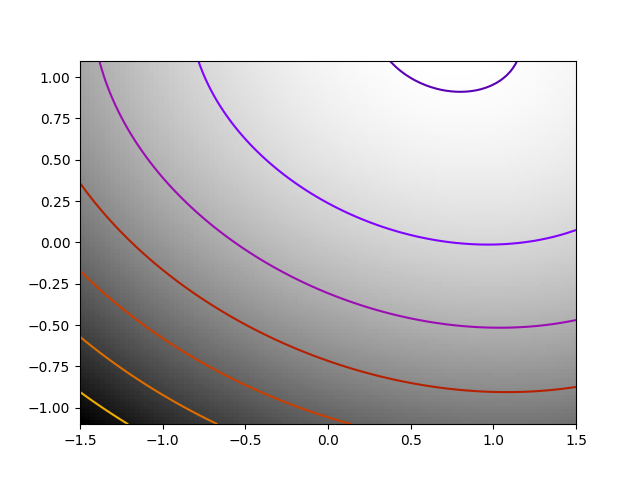Note
Go to the end to download the full example code.
2.7.4.9. Alternating optimization¶
The challenge here is that Hessian of the problem is a very ill-conditioned matrix. This can easily be seen, as the Hessian of the first term in simply 2 * K.T @ K. Thus the conditioning of the problem can be judged from looking at the conditioning of K.
import time
import numpy as np
import scipy as sp
import matplotlib.pyplot as plt
rng = np.random.default_rng(27446968)
K = rng.normal(size=(100, 100))
def f(x):
return np.sum((K @ (x - 1)) ** 2) + np.sum(x**2) ** 2
def f_prime(x):
return 2 * K.T @ K @ (x - 1) + 4 * np.sum(x**2) * x
def hessian(x):
H = 2 * K.T @ K + 4 * 2 * x * x[:, np.newaxis]
return H + 4 * np.eye(H.shape[0]) * np.sum(x**2)
Some pretty plotting
plt.figure(1)
plt.clf()
Z = X, Y = np.mgrid[-1.5:1.5:100j, -1.1:1.1:100j] # type: ignore[misc]
# Complete in the additional dimensions with zeros
Z = np.reshape(Z, (2, -1)).copy()
Z.resize((100, Z.shape[-1]))
Z = np.apply_along_axis(f, 0, Z)
Z = np.reshape(Z, X.shape)
plt.imshow(Z.T, cmap="gray_r", extent=(-1.5, 1.5, -1.1, 1.1), origin="lower")
plt.contour(X, Y, Z, cmap="gnuplot")
# A reference but slow solution:
t0 = time.time()
x_ref = sp.optimize.minimize(f, K[0], method="Powell").x
print(f" Powell: time {time.time() - t0:.2f}s")
f_ref = f(x_ref)
# Compare different approaches
t0 = time.time()
x_bfgs = sp.optimize.minimize(f, K[0], method="BFGS").x
print(
f" BFGS: time {time.time() - t0:.2f}s, x error {np.sqrt(np.sum((x_bfgs - x_ref) ** 2)):.2f}, f error {f(x_bfgs) - f_ref:.2f}"
)
t0 = time.time()
x_l_bfgs = sp.optimize.minimize(f, K[0], method="L-BFGS-B").x
print(
f" L-BFGS: time {time.time() - t0:.2f}s, x error {np.sqrt(np.sum((x_l_bfgs - x_ref) ** 2)):.2f}, f error {f(x_l_bfgs) - f_ref:.2f}"
)
t0 = time.time()
x_bfgs = sp.optimize.minimize(f, K[0], jac=f_prime, method="BFGS").x
print(
f" BFGS w f': time {time.time() - t0:.2f}s, x error {np.sqrt(np.sum((x_bfgs - x_ref) ** 2)):.2f}, f error {f(x_bfgs) - f_ref:.2f}"
)
t0 = time.time()
x_l_bfgs = sp.optimize.minimize(f, K[0], jac=f_prime, method="L-BFGS-B").x
print(
f"L-BFGS w f': time {time.time() - t0:.2f}s, x error {np.sqrt(np.sum((x_l_bfgs - x_ref) ** 2)):.2f}, f error {f(x_l_bfgs) - f_ref:.2f}"
)
t0 = time.time()
x_newton = sp.optimize.minimize(
f, K[0], jac=f_prime, hess=hessian, method="Newton-CG"
).x
print(
f" Newton: time {time.time() - t0:.2f}s, x error {np.sqrt(np.sum((x_newton - x_ref) ** 2)):.2f}, f error {f(x_newton) - f_ref:.2f}"
)
plt.show()

Powell: time 0.13s
BFGS: time 0.58s, x error 0.02, f error -0.03
L-BFGS: time 0.09s, x error 0.02, f error -0.03
BFGS w f': time 0.14s, x error 0.02, f error -0.03
L-BFGS w f': time 0.07s, x error 0.02, f error -0.03
Newton: time 0.01s, x error 0.02, f error -0.03
Total running time of the script: (0 minutes 1.290 seconds)